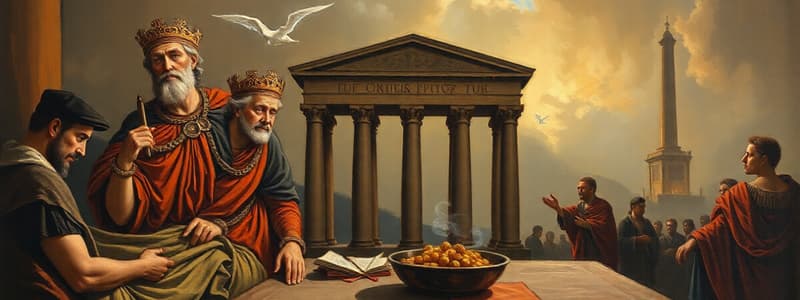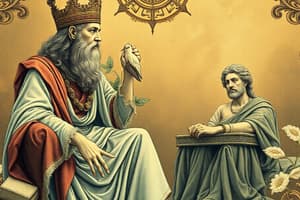Podcast
Questions and Answers
What does the word 'democracy' literally mean?
What does the word 'democracy' literally mean?
- Rule by the elite
- Government by philosophers
- Authority of the government
- Power of the people (correct)
According to the discussion, what is a potential consequence of inaction in a democratic system?
According to the discussion, what is a potential consequence of inaction in a democratic system?
- It enhances the power of the elite
- It can evolve into tyranny (correct)
- It may result in gradual improvement
- It leads to greater participation
What does the author suggest about the interpretation of 'people' in the context of democracy?
What does the author suggest about the interpretation of 'people' in the context of democracy?
- It can refer to a singular collective entity (correct)
- It universally refers to all individuals
- It negates the existence of individuality
- It implies exclusive groups only
What does Abraham Lincoln's definition of democracy emphasize?
What does Abraham Lincoln's definition of democracy emphasize?
In the context of democratic governance, what is a dilemma presented regarding the pursuit of ends by individuals?
In the context of democratic governance, what is a dilemma presented regarding the pursuit of ends by individuals?
What grammatical issue does the author highlight concerning the term 'people'?
What grammatical issue does the author highlight concerning the term 'people'?
What can be inferred about the author's view on the necessity of philosopher-citizens in democracy?
What can be inferred about the author's view on the necessity of philosopher-citizens in democracy?
Which of the following concepts is closely related to the definition of democracy as provided?
Which of the following concepts is closely related to the definition of democracy as provided?
What is the main capacity that Plato refers to when discussing the cultivation of reason?
What is the main capacity that Plato refers to when discussing the cultivation of reason?
According to Plato, who is best suited to rule justly and wisely?
According to Plato, who is best suited to rule justly and wisely?
What must the people cultivate in order to prevent democracy from degenerating into tyranny?
What must the people cultivate in order to prevent democracy from degenerating into tyranny?
Why is education into political values considered crucial for democracy?
Why is education into political values considered crucial for democracy?
What paradox is presented regarding values in a democracy?
What paradox is presented regarding values in a democracy?
What is Immanuel Kant’s conception of an ideal democratic society called?
What is Immanuel Kant’s conception of an ideal democratic society called?
What does Plato suggest about the relationship between personal good and the good order?
What does Plato suggest about the relationship between personal good and the good order?
What must citizens in a democracy prioritize to ensure its success?
What must citizens in a democracy prioritize to ensure its success?
How does Kant's view of freedom differ from Plato's perspective on democracy?
How does Kant's view of freedom differ from Plato's perspective on democracy?
What is Plato's main argument against democracy?
What is Plato's main argument against democracy?
What does Kant believe is necessary for a functional democracy?
What does Kant believe is necessary for a functional democracy?
According to Kant, what constitutes the highest expression of individual freedom?
According to Kant, what constitutes the highest expression of individual freedom?
What role does the educational establishment play in a sound democracy, according to the content?
What role does the educational establishment play in a sound democracy, according to the content?
What is a key difference in the assumptions about citizens between Plato and Kant?
What is a key difference in the assumptions about citizens between Plato and Kant?
What is the primary purpose of the education necessary for democracy, as argued in the content?
What is the primary purpose of the education necessary for democracy, as argued in the content?
What does Kant believe about the nature of democracy?
What does Kant believe about the nature of democracy?
What does Thomas Hobbes suggest is a core aspect of human nature?
What does Thomas Hobbes suggest is a core aspect of human nature?
In Kant's theory, what principle must supersede individual interests in a democratic society?
In Kant's theory, what principle must supersede individual interests in a democratic society?
How does Kant define true freedom in a democratic context?
How does Kant define true freedom in a democratic context?
What is the relationship between individual citizens in the Kingdom of Ends, according to Kant?
What is the relationship between individual citizens in the Kingdom of Ends, according to Kant?
What misapprehension does the appeal of democracy create regarding the role of citizens?
What misapprehension does the appeal of democracy create regarding the role of citizens?
What distinguishes the Kingdom of Ends from a society of tyrants?
What distinguishes the Kingdom of Ends from a society of tyrants?
Which of the following is NOT associated with Kant's Kingdom of Ends?
Which of the following is NOT associated with Kant's Kingdom of Ends?
According to the concepts discussed, what can undermine the ideals of democracy?
According to the concepts discussed, what can undermine the ideals of democracy?
What is the primary aim of engaging students in value inquiry during high school?
What is the primary aim of engaging students in value inquiry during high school?
Why is a robust program of value-oriented education deemed essential for democracy?
Why is a robust program of value-oriented education deemed essential for democracy?
According to the author, what philosophical education should be at the heart of the public school curriculum?
According to the author, what philosophical education should be at the heart of the public school curriculum?
What does the term 'people' refer to in the context of democracy, as discussed in the content?
What does the term 'people' refer to in the context of democracy, as discussed in the content?
What is Plato's perspective on the role of philosophy in democracy?
What is Plato's perspective on the role of philosophy in democracy?
What is implied about the citizens' roles in a functioning democracy?
What is implied about the citizens' roles in a functioning democracy?
What potential outcome is presented regarding the absence of value-oriented education?
What potential outcome is presented regarding the absence of value-oriented education?
Who can become the 'morally-realized citizen-kings' of Kant's Kingdom of Ends?
Who can become the 'morally-realized citizen-kings' of Kant's Kingdom of Ends?
Flashcards are hidden until you start studying
Study Notes
Democracy and Tyranny
- Democracy defined as ‘power of the people’ (Greek: ‘demos’ - people, ‘kratos’ - power).
- Plato in "Republic" argues that inaction can lead democracy to tyranny; deterioration occurs naturally.
- The word ‘people’ can refer to individuals or a collective entity, creating ambiguity in democratic governance.
Human Nature and Democracy
- Jefferson stated democracy's principles are "self-evident," but they lack clear roots in human behavior.
- Hobbes highlighted human nature as inclined toward tyranny; individual desires often conflict with collective good.
- True democracy demands recognition of responsibility toward others, transcending self-interests.
Kant's Kingdom of Ends
- Kant describes an ideal society where every individual is both a sovereign and an end-in-themselves.
- Respect for others’ dignity must prevail over personal interests for democracy to function.
- Individual freedom, according to Kant, involves moral duty and doing what is right, not merely personal gratification.
Philosophers and Education in Democracy
- Plato asserts that philosopher-kings, possessing intellect and character, are necessary for just governance.
- To prevent tyranny, citizens must embody characteristics of philosopher-kings, necessitating the cultivation of ‘philosopher-citizens’.
- Education plays a vital role in developing moral and intellectual virtues essential to a healthy democracy.
The Role of Education
- Education must go beyond basic knowledge to actively engage citizens in values inquiry.
- Moral and ethical education should be central to a robust democracy, counteracting popular media influences.
- The educational system should instill respect for the dignity and freedom of others, fostering a collective good.
The Power of the People
- Democracy requires citizens to understand the connection between individual dignity and societal well-being, balancing private and public interests.
- An educated citizenry is crucial to uphold democratic values, countering the selfish tendencies inherent in human nature.
- Effective democratic governance hinges on individuals recognizing their ethical duties, which can be cultivated through philosophical education.
Conclusion
- The term ‘people’ encompasses both individual and collective aspects, necessitating moral sophistication in citizens.
- A value-oriented, ethical education is paramount to prevent societal decay and ensure democracy's survival.
- Without such education, societies face ongoing strife and injustice, as noted by Plato.
Studying That Suits You
Use AI to generate personalized quizzes and flashcards to suit your learning preferences.




